Top Independent Living Centers: Your Resource Guide
Navigating Independent Living Centers
Understanding the Role of ILCs
Independent Living Centers (ILCs) serve as pivotal establishments that empower people with disabilities through various programs and advocacy. These centers are managed by individuals with disabilities, ensuring that they are consumer-controlled and community-based. The integral mission of ILCs is to promote equality, inclusivity, and independence by engaging people with disabilities in living more self-sufficient lives. Through shared experiences and community connection, ILCs offer a supportive environment that fosters independence and personal growth.
Key Services Offered by ILCs
ILCs offer a comprehensive array of services tailored to support individuals in achieving independent living. These services include:
- Information and Referral Assistance: ILCs provide essential information and connect individuals with the necessary resources to facilitate independent living choices.
- Independent Living Skills Training: Programs are available to help individuals develop skills crucial for daily living and increased self-reliance.
- Peer Support: Through shared experiences, peer mentors offer guidance and emotional support, fostering a sense of community.
- Advocacy: Both individual and systems advocacy services are provided to ensure that individuals’ rights and needs are addressed within the larger societal framework.
- Transition Services: ILCs assist with transitioning from institutional settings to community-based living, ensuring smoother reintegration and support for those at risk of institutionalization.
Each service is designed to empower individuals by giving them the tools and support needed to live more independently and with dignity.

Spotlight on Top Independent Living Centers
Noteworthy Centers Nationwide
Several Independent Living Centers across the United States have gained recognition for their exceptional programs and services. These centers have individualized approaches to promoting independent living and shine through various innovative initiatives.
- VOLAR Center for Independent Living (El Paso, TX): Known for its comprehensive advocacy programs, VOLAR provides extensive peer mentoring and community transition services to aid individuals in achieving autonomy.
- Living Independence for Everyone Inc. (LIFE) (Jackson, MS): LIFE’s focus on community-based training and support services has made significant strides in promoting disability rights and community engagement.
- Harlem Independent Living Center (New York, NY): This center emphasizes cultural competency and local community involvement, offering personalized services to a diverse demographic.
- Blue Water Center for Independent Living (Port Huron, MI): Recognized for its dynamic educational and independent living skills programs, Blue Water is instrumental in aiding individuals in rural areas.
- Disability Network West Michigan Center for Independent Living (Muskegon, MI): Praised for its holistic support services that encompass transportation and housing solutions, this center caters to community-specific needs effectively.
Each of these centers exemplifies dedication and commitment to enhancing the quality of life for individuals with disabilities. Their unique programs deliver integrated support that aligns with the diverse goals of their service users while fostering inclusion within their local communities.

Unique Programs and Initiatives
Independent Living Centers nationwide are known for spearheading unique programs and initiatives aimed at empowering individuals with disabilities. Here are some standout offerings:
- Recreation Engagement Programs: Some centers use recreational activities as a method of teaching soft skills. This innovative approach equips transition-aged youth with vital skills for competitive, integrated employment.
- Assistive Technology (AT) Services: Several ILCs provide loans, repairs, and purchases of AT devices. These services enhance mobility and self-sufficiency for individuals by making technology more accessible.
- Emergency Preparedness Initiatives: To ensure that individuals with disabilities are not overlooked in emergencies, some centers run programs focused on disaster preparedness, emphasizing tailored strategies for safety and protection.
- Spanish Language Programs: Recognizing the importance of language inclusivity, multiple centers offer services and resources in Spanish, ensuring non-English speakers receive the support they need.
- Housing Consultations and Travel Training: ILCs provide specialized support in finding accessible housing and training individuals to navigate public transport, promoting greater independence in daily life.
These programs demonstrate the ongoing commitment of ILCs to adapt services that reflect the evolving needs of the disability community.
Essential Resources for Families and Caregivers
Accessing Support and Assistance
Accessing support and assistance through Independent Living Centers is a streamlined process designed to be accessible to everyone. Individuals can start by contacting their local ILC for an initial consultation, which can be done through phone calls, emails, or in-person visits. During this consultation, individuals will receive personalized guidance on available services and support resources tailored to their needs.
Each ILC provides a wealth of information about community services, ranging from housing options to vocational training programs. Their teams of trained professionals and peer mentors are equipped to handle a wide array of inquiries and offer relevant referrals to external service providers when needed. Moreover, ILCs often host educational workshops and community events, which are excellent opportunities for individuals to connect and learn about the diverse support structures in place.
For those who prefer digital engagement, many ILCs maintain informative websites with directories and resource guides to assist users remotely. Some centers also offer online chats or forums, enhancing accessibility and support availability.
Navigating Housing and Transportation Options
Navigating housing and transportation options is a crucial aspect of achieving independent living, and Independent Living Centers provide vital assistance in these areas.
Housing Support: ILCs offer consultations to help individuals understand their housing rights and explore affordable and accessible housing options. Programs might include assistance with modifying homes for accessibility or connecting individuals with housing authorities to secure suitable accommodations.
Transportation Services: Addressing transportation challenges, particularly for those unable to drive, is another area where ILCs excel. By offering travel training programs and connecting individuals with accessible transportation services, ILCs help ensure mobility independence. Some centers also provide resources for public transportation passes or work with local advocacy groups to improve transit services.
Through these services, individuals receive not only practical support but also guidance in navigating the complexities of housing and transportation, enabling more self-sufficient living.

Achieving Independence: Success Stories
Empowerment through Peer Support
Peer support is a foundational element in the empowerment process at Independent Living Centers. This approach leverages the shared experiences of individuals with disabilities to foster a community of understanding and mutual respect. By connecting with peers who have faced similar challenges, individuals are provided with role models who exemplify resilience and independence.
Peer mentors offer guidance not only through personal insights and encouragement but also by illustrating practical ways to navigate daily obstacles. Whether it’s discussing adaptive strategies or advocating for oneself, peer support groups create a safe environment for open dialogue and shared learning. These interactions significantly boost confidence and facilitate personal growth, bridging gaps that traditional support systems may overlook.
Such supportive networks cultivate a sense of belonging and community, crucial for reducing feelings of isolation. At Independent Living Centers, one can partner with peers, counselors, and advocates to become more independent and empowered in their personal journeys.
Transformative Impact on Lives
The transformative impact of Independent Living Centers on individuals’ lives is profound and multifaceted. Through targeted services, individuals with disabilities often experience newfound levels of independence and self-sufficiency. For many, this begins with gaining access to critical resources such as assistive technologies and skills training, which empower them to perform daily activities with confidence.
Participation in the programs offered by ILCs often results in enhanced quality of life and personal achievement. Individuals frequently report a sense of self-empowerment, citing increased social engagement and reduced isolation. Additionally, successful employment transitions and community integration fostered by ILC services lead to economic independence and improved mental health.
ILCs also play a crucial role in altering public perceptions and advocating for systemic change. By promoting inclusivity in education, labor, and society at large, these centers ensure that individuals with disabilities are recognized not as beneficiaries of charity, but as active contributors to their communities.

The Future of Independent Living
Emerging Trends in ILCs
In recent years, several emerging trends have shaped the landscape of Independent Living Centers, reflecting an adaptive response to evolving needs and societal shifts.
Digital Transformation: With the advent of technology, many ILCs are enhancing their services through the use of digital platforms. This includes virtual meetings, telehealth services, and online resource directories, making support more accessible to individuals who may face transportation or mobility challenges.
Focus on Mental Health: Recognizing the interplay between physical disabilities and mental well-being, many centers are integrating mental health services into their offerings. This holistic approach includes counseling, stress management workshops, and peer support groups, addressing the comprehensive needs of their communities.
Environmental and Sustainability Initiatives: A growing trend is the incorporation of eco-friendly practices within ILC operations. Centers are engaging in projects that not only promote environmental sustainability but also educate service users on living more sustainable lives.
Inclusive Employment Programs: Emphasis on employment for individuals with disabilities has led to initiatives that partner with local businesses to create inclusive job opportunities. These programs focus on skill development and advocacy, breaking down barriers to employment.
Enhancing Diversity and Inclusion Efforts: ILCs are broadening their scope to be more inclusive of all races, ethnicities, and non-traditional disabilities, ensuring servicesare tailored to meet the diverse needs of their communities. This involves targeted outreach and culturally competent practices to ensure that all individuals feel welcome and supported.
These trends highlight the dynamic nature of ILCs and their commitment to fostering an inclusive and supportive environment for all individuals with disabilities. By staying ahead of these trends, ILCs continue to offer relevant and impactful services that cater to the needs of their users.
Enhancing Services through Technology
Independent Living Centers are increasingly leveraging technology to enhance their service offerings and expand their reach. Through the integration of digital tools, ILCs are transforming the way they deliver support, making services more accessible and efficient.
Virtual Workshops and Training Programs: By offering online educational sessions and skill-building workshops, ILCs allow individuals to participate from the comfort of their homes. This removes geographical and physical barriers, enabling wider access to valuable resources and learning opportunities.
Telehealth and Remote Support: Many centers now utilize telehealth platforms to provide remote health consultations, mental health support, and advisory services. This technological advancement is particularly beneficial for those in rural or underserved areas, offering immediate access to professional assistance.
Assistive Technology Loans and Demonstrations: ILCs often provide opportunities for individuals to trial assistive technologies before committing to a purchase. This hands-on approach allows users to find the right devices suited to their needs, facilitated by expert guidance and training from knowledgeable staff.
Personalized Digital Resource Centers: Online portals equipped with information on services, community events, and advocacy initiatives empower users to navigate their independence journey with greater autonomy. Accessible 24/7, these resources ensure continuous support and engagement.
Through these technological advancements, Independent Living Centers are reinforcing their mission to offer comprehensive, personalizedsupport that adapts to the modern age, enhancing independence and quality of life for individuals with disabilities.

FAQs
What is an Independent Living Center?
An Independent Living Center (ILC) is a community-based, non-residential organization designed to support people with disabilities in living as independently as possible. Managed and operated by individuals with disabilities, these centers provide resources and services such as skills training, peer support, advocacy, and information referrals to empower independence and community integration.
How can I find a local ILC near me?
To find a local Independent Living Center (ILC) near you, start by visiting national networks like the National Council on Independent Living (NCIL) website, which offers a directory of ILCs by state. Alternatively, contacting state vocational rehabilitation agencies can provide guidance and referrals to nearby centers.
Are there specific services available for individuals with developmental disabilities?
Yes, many Independent Living Centers offer specialized services for individuals with developmental disabilities. These may include tailored skills training, advocacy support, peer mentoring, assistive technology services, and transition planning to promote independent living and community involvement. Each ILC may provide unique programs based on local needs.

